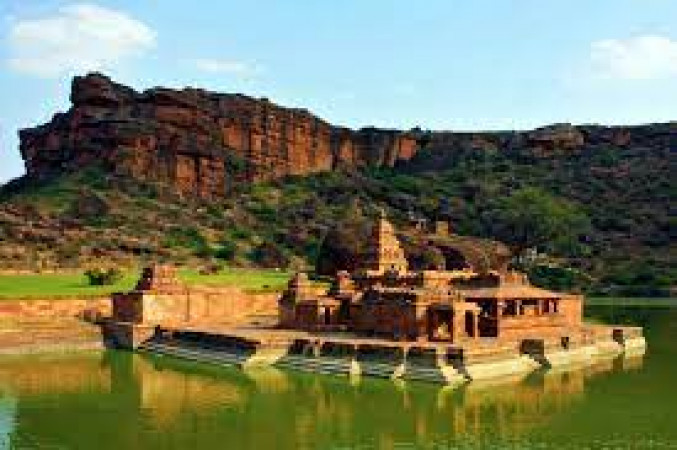Bhuthanatha Temples Travel Guide
Bhuthanatha Temples, located in Karnataka, India, are a group of ancient temples dedicated to Lord Shiva. These temples hold great historical and cultural significance, with their intricate architecture dating back to the Chalukya dynasty. The temples are nestled amidst the picturesque Badami Cave Temples and are famous for their rock-cut structures and stunning sculptures, making them a must-visit for history buffs and architecture enthusiasts.Top Attractions in Bhuthanatha Temples
- Badami Cave Temples
- Banashankari Temple
- Aihole Temples
- Pattadakal Temples
- Agastya Lake
Bhuthanatha Temples is Famous for
Its mesmerizing rock-cut architecture and intricate sculptures.Top Attractions in Bhuthanatha Temples
- Exploring the Badami Cave Temples
- Witnessing the stunning Banashankari Temple
- Visiting the ancient Aihole Temples
- Marveling at the architectural wonders of Pattadakal Temples
- Relaxing by the serene Agastya Lake
What's Great about Travelling to Bhuthanatha Temples?
- Perfect for history and architecture enthusiasts
- Peaceful and spiritual ambiance
- Unique cultural experiences
- Breathtaking natural beauty
What's Not So Great about Travelling to Bhuthanatha Temples?
- Limited modern facilities
- Remote location
- Hot and humid weather
- Language barrier for non-local visitors
Travel Tips for Bhuthanatha Temples
- Check visa requirements before traveling
- Opt for local transportation for a more authentic experience
- Respect the local customs and traditions
- Stay hydrated and carry sunscreen
Important Bhuthanatha Temples trip information
- Ideal Duration: 2-3 days
- Best Time to Visit: October to March
- Nearby Airports and Railway Stations: Hubli Airport and Badami Railway Station
FAQ's on Bhuthanatha Temples
Q1: What is the best time to visit Bhuthanatha Temples?
The best time to visit Bhuthanatha Temples is during the winter months from November to February when the weather is pleasant and ideal for exploring the ancient temples. This period also coincides with many festivals and events in the region, offering a vibrant cultural experience. It is advisable to avoid the monsoon season from June to September due to heavy rainfall that may disrupt travel plans.
Q2: Do I need a visa to travel to Bhuthanatha Temples?
Travelers to Bhuthanatha Temples need to obtain a visa before arrival, which can be processed through the Bhutanese embassy or authorized tour operators. Exceptions include Indian, Bangladeshi, and Maldivian citizens who can obtain a permit on arrival. It is essential to check the specific visa requirements based on your nationality before planning your trip.
Q3: What are the must-visit attractions in Bhuthanatha Temples?
The must-visit attractions in Bhuthanatha Temples include the historic Bhuthanatha Temples themselves, known for their intricate architecture and religious significance. Other notable places to visit are the surrounding archaeological sites, such as the Jain temples and cave complexes that offer a glimpse into the region's rich history and culture.
Q4: Is Bhuthanatha Temples a safe place to travel?
Bhuthanatha Temples is generally a safe destination for travelers. However, it is advisable to be cautious of pickpocketing in crowded areas and to avoid isolated areas, especially at night. It is recommended to follow basic safety precautions, such as staying alert and keeping valuables secure, to ensure a smooth travel experience.
Q5: What is the local currency in Bhuthanatha Temples and can I use credit cards?
The local currency in Bhuthanatha Temples is the Bhutanese Ngultrum (BTN), although Indian Rupees are widely accepted. While credit cards are becoming more common in tourist areas, it is advisable to carry cash for transactions, especially in rural areas. ATMs are available in major towns for convenient access to money.
Q6: What is the local cuisine like in Bhuthanatha Temples?
The local cuisine in Bhuthanatha Temples is characterized by traditional Bhutanese dishes like Ema Datshi (chili and cheese stew) and Momos (dumplings). Food in Bhutan is often spicy and influenced by Tibetan and Indian flavors. Travelers with dietary restrictions can find options such as rice, vegetables, and dairy products, but it's recommended to inform restaurants in advance.
Q7: What transportation options are available in Bhuthanatha Temples?
Transportation options in Bhuthanatha Temples include public buses, taxis, and car rentals. While public buses are economical, taxis provide a more convenient way to explore the region. Car rentals are also available for travelers who prefer to drive independently. It's essential to plan transportation in advance, especially for visits to remote areas.
Q8: Are there any cultural norms or etiquette I should be aware of when visiting Bhuthanatha Temples?
When visiting Bhuthanatha Temples, it is important to respect local customs and traditions. Dress modestly, especially when entering religious sites, and remove shoes before entering temples. It is customary to greet locals with a respectful "Kuzuzangpo" and ask for permission before taking photographs. Avoid public displays of affection and be mindful of cultural sensitivities to ensure a respectful and enjoyable visit.
Q9: I am a travel agent. How can I buy travel leads of Bhuthanatha Temples?
Register yourself as a travel agent at agents.tripclap.com and then you can buy travel leads to Bhuthanatha Temples once your account is approved. For more details contact our support team at +91-8069186564 or support@tripclap.com

